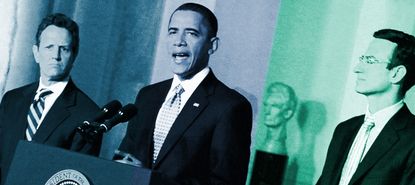How do you fight a recession? Not like this.
It's 2019 and Peter Orszag is still mostly clueless about the Obama stimulus


At this moment 10 years ago, the incoming Obama administration was feverishly trying to figure out how to keep the financial crisis from deep-sixing the American economy. All data showed an economy in free-fall, and so even panicked moderates turned to Keynesian government spending to prevent another Great Depression and restore full employment.
The stimulus succeeded in its first goal, but failed in its second. A full-blown depression was avoided, but in its place we got a sort of lesser depression that was not as severe — but continues to this day. We are right now perhaps $3 trillion below the 1945-2007 output trendline (more than the GDP of California).
Another recession will come at some point, probably within the next couple years. Trump may be sparking it right now with his pointless government shutdown. It will be critical for future policymakers to not repeat the mistakes of Obama's Recovery Act.
Subscribe to The Week
Escape your echo chamber. Get the facts behind the news, plus analysis from multiple perspectives.

Sign up for The Week's Free Newsletters
From our morning news briefing to a weekly Good News Newsletter, get the best of The Week delivered directly to your inbox.
From our morning news briefing to a weekly Good News Newsletter, get the best of The Week delivered directly to your inbox.
Peter Orszag — who was the budget director when the stimulus was signed — has a list of Recovery Act lessons which makes a good jumping-off point. He draws several obviously correct conclusions: that stimulus works, that you shouldn't expect Republicans to vote for it no matter what is happening, and that you shouldn't take long-term economic projections too seriously.
However, some of his ideas are clearly wrong. In keeping with his deficit paranoiac politics, he argues that "policymakers should devise deficit-reduction measures that take effect gradually in the future." In reality, austerity is for rubes. The risks of deficit spending are hugely overblown, and the dangers are as much on the "too small" side as they are on the "too large" side. (There's also the fact that when Democrats cut the deficit, Republicans instantly give the savings to the rich whenever they retake power.)
Orszag also argues that stimulus shouldn't be used to effect wholesale transformations of the economy, because "Trying to include other sweeping changes in a contentious political environment would have endangered enactment of the stimulus package and hurt the economy." On the contrary, Franklin Roosevelt's New Deal overhauled the basic American economic structure and was vastly more politically durable as a result.
And when the point of a spending program is to just fling money out the door as fast as possible, why not use that to accomplish vital goals like de-carbonizing the economy or rebuilding infrastructure? The best parts of the Recovery Act were the bits where they rooted around the policy shelf and stuffed in half the dream liberal goodies accumulated over a generation (like a massive green energy research fund) just to get the headline number up.
Interestingly, Orszag's best and worst points are tied up with one another. He says liberals are wrong to complain that the stimulus is too small, because the real problem was it didn't last long enough. Even in the short term, this was clearly wrong, as unemployment was 10 percent even on election day 2010 when the money was still flowing — implying that more money would have restored employment more quickly (and reduced Democratic losses). But even on its own terms this makes no sense at all — it should have had the same cash outflow sustained over a longer time … thus spending more money?
But Orszag also argues for a very smart idea: ongoing stimulus triggers. The idea is to build in ongoing future spending mechanisms into a stimulus package which will keep the money flowing so long as the economy is still weak. (This implicitly contradicts his "it wasn't too small" argument, but never mind.) For example, you could have $500 billion initial spend followed by another $100 billion every month that unemployment is above 6 percent and inflation below 4 percent. If Congressional Democrats had done something like that in 2009, the depression would have been cured six to eight years ago, instead of still being felt to this day.
This kind of topic is the most important one to keep in mind in the future. The debate over the 2009 stimulus was obsessively focused on topics which turned out to be completely irrelevant or horribly mistaken. Then-Obama economic adviser Larry Summers was fixated on keeping the number below an arbitrary "nonplanetary" number to appease moderate Democrats — while nobody tried to argue to those people that they would lose their seats if the stimulus was too small, which is what actually happened. Others focused maniacally on "shovel-ready" projects and avoiding waste so that the stimulus could be as "efficient" as possible in terms of jobs per dollar spent. This fussy attitude paradoxically led to even more waste in terms of unemployment and lost output — even if some project costs a bit too much, that's far better than simply allowing unemployed people to sit around losing skills and their financial security.
In other words, being timid about stimulus during a recession is hideously risky both politically and economically. Paul Krugman was shouting himself hoarse about this at the time, but nobody in power listened to him.
So the basic lesson of the Great Recession is this: When the economy is falling into the toilet, full employment and output is the only thing that matters. Government should simply "fling resources in the general vicinity of the problem," trying if possible to solve any other issues that logically fit with that priority. But if driving around the country blasting wads of cash out of a T-shirt cannon is the only way to get the money out the door, then that is the sensible, buttoned-down thing to do.
Create an account with the same email registered to your subscription to unlock access.
Sign up for Today's Best Articles in your inbox
A free daily email with the biggest news stories of the day – and the best features from TheWeek.com
Ryan Cooper is a national correspondent at TheWeek.com. His work has appeared in the Washington Monthly, The New Republic, and the Washington Post.
-
 Why au pairs might become a thing of the past
Why au pairs might become a thing of the pastUnder The Radar Brexit and wage ruling are threatening the 'mutually beneficial arrangement'
By Chas Newkey-Burden, The Week UK Published
-
 'A direct, protracted war with Israel is not something Iran is equipped to fight'
'A direct, protracted war with Israel is not something Iran is equipped to fight'Instant Opinion Opinion, comment and editorials of the day
By Harold Maass, The Week US Published
-
 Today's political cartoons - April 17, 2024
Today's political cartoons - April 17, 2024Cartoons Wednesday's cartoons - political anxiety, jury sorting hat, and more
By The Week US Published